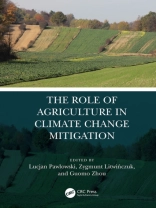According to IPCC reports, one of the greatest threats to the Earth ecosystems is climate change caused by the anthropogenic emissions of greenhouse gases, mostly carbon dioxide, mainly from the combustion of fossil fuels, cement production and land-use change which leads to an excessive temperature rise. Agriculture and forestry are responsible for quiet big emissions of greenhouse gases: CO2, CH4 and N2O, and have significant potential to reduce these emissions mainly through enhancement of CO2 absorption by terrestrial ecosystems.
To evaluate the impact of agriculture on climate change, ruminant farming should be also taken into account. These animals emit considerable amounts of methane which has strong greenhouse effects. Methane emissions may be reduced by using appropriate feed for ruminants. Decreasing the meat consumption of these animals can also make an important contribution to reducing methane emissions.
The methods for reducing greenhouse gas emissions through appropriate management of terrestrial ecosystems and animal husbandry are widely discussed in The Role of Agriculture in Climate Change Mitigation. The book will be of interest to academics, professionals and policy makers in environmental sciences.












